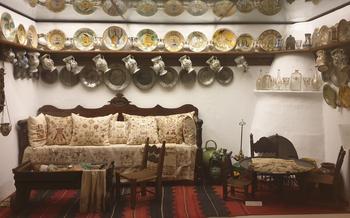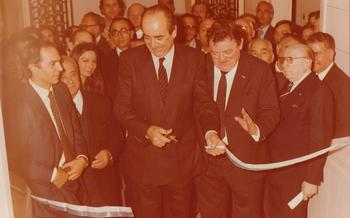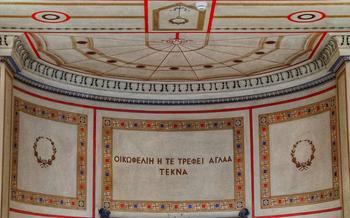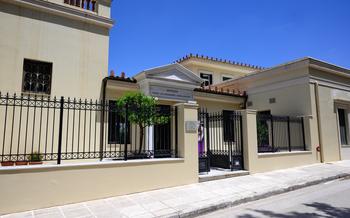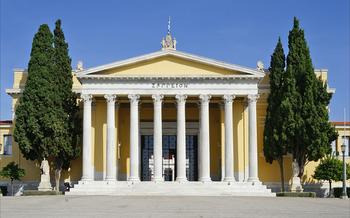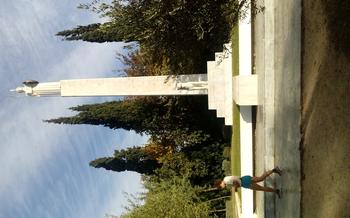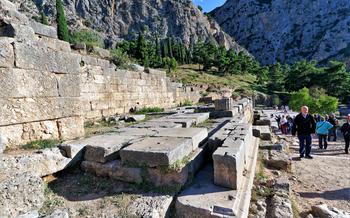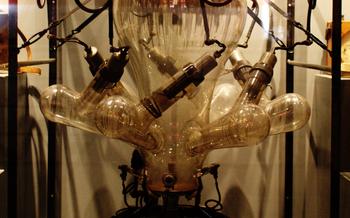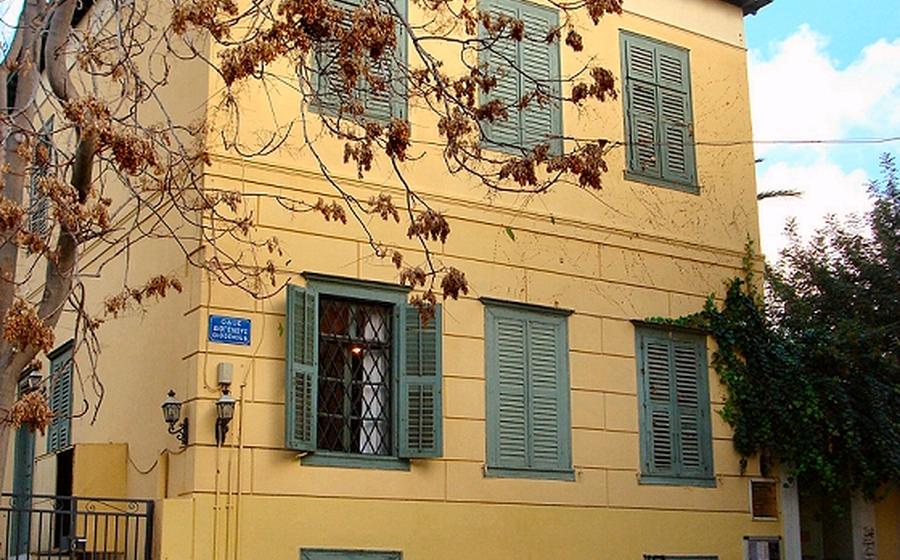
Museum of Popular Music Instruments
- Historical Background:
- Museum Location:
- Museum Hours and Admission Fees:
- The Collection:
- Interactive Exhibits:
- Guided Tours
- Workshops and Classes:
- Events and Performances:
- Educational Programs:
- Research and Documentation Center
- Museum Gift Shop
- Accessibility
- Reviews and Visitor Feedback
- Social Media Presence
- Insider Tip:
Historical Background:
The enchanting realm of Greek music, with its evocative melodies and captivating rhythms, finds its roots in a rich tapestry of cultural influences that have shaped the nation's artistic heritage. Throughout history, Greece has served as a vibrant crossroads for diverse civilizations, each leaving an indelible mark on the country's musical traditions. From the ancient Greeks, who held music in high esteem, to the Byzantine Empire's sacred chants, and the influences of Ottoman rule, Greek music has evolved into a captivating blend of East and West.
At the heart of this musical journey lies the Museum of Popular Music Instruments, a treasure trove dedicated to preserving and celebrating the instruments that have played a pivotal role in shaping Greece's unique soundscape. Established in 1991 by the Ethnological Society of Greece, the museum stands as a testament to the enduring legacy of Greek music and its profound impact on the nation's cultural identity.
Museum Location:
The Museum of Popular Music Instruments is conveniently located in the heart of Athens, on Diogenous Street, in the picturesque neighborhood of Plaka. To get there by public transportation, take the metro to the Syntagma station and walk for about 10 minutes towards the Acropolis. Alternatively, you can catch the bus lines 227 or 856 and get off at the "Plaka" stop. If you're driving, there are several parking garages nearby, including the Ermou and the Monastiraki parking lots.
Museum Hours and Admission Fees:
The Museum of Popular Music Instruments in Athens is open to the public from Tuesday to Sunday, with slightly different hours on each day. From Tuesday to Friday, it is open from 10:30 AM to 4:00 PM, while on weekends, the hours are extended until 5:00 PM. It remains closed on Mondays, allowing the staff to maintain and clean the exhibits.
Admission fees are charged to provide financial support for the museum's preservation and educational initiatives. The entrance fee for adults is set at 5 euros, providing an affordable opportunity for visitors to explore the richness of Greek music. Students and children aged 6 to 18 are granted a discounted rate of 3 euros, encouraging young people's engagement with this cultural heritage. Children under the age of 6 are offered free admission, allowing families to share this cultural experience without financial constraints.
The Collection:
The Museum of Popular Music Instruments in Athens boasts a diverse and captivating collection of traditional Greek instruments. Visitors can marvel at the intricate craftsmanship exhibited in a wide range of stringed, wind, and percussion instruments. Among the highlights are the bouzouki, a long-necked lute with a distinctive sound that has become synonymous with Greek music. The museum also showcases the santouri, a trapezoidal dulcimer with a rich, resonant tone, and the lyra, a bowed instrument with a haunting melody. Additionally, visitors can explore the various types of flutes, drums, and percussion instruments, each with its own unique characteristics and significance in Greek music. The collection provides a comprehensive overview of the diverse musical heritage of Greece, offering a glimpse into the cultural richness and creativity of the Greek people.
Interactive Exhibits:
The Museum of Popular Music Instruments takes visitor engagement to a whole new level with its interactive exhibits. Here, visitors are not mere spectators; they become active participants in the musical journey. Numerous instruments are displayed in a way that encourages hands-on exploration. Touching, strumming, and plucking are not only allowed but encouraged.
The museum's interactive exhibits are a testament to its commitment to providing a truly immersive experience. Visitors can try their hand at playing traditional instruments, replicating the sounds and rhythms of Greek music. Interactive screens and audio guides offer additional information about the instruments, their history, and their cultural significance.
Through these interactive exhibits, the Museum of Popular Music Instruments not only showcases Greek musical heritage but also ignites a passion for music in visitors of all ages. It is an experience that transforms passive observation into active participation, creating lasting memories and a deeper appreciation for the rich musical traditions of Greece.
Guided Tours
The Museum of Popular Music Instruments offers guided tours in Greek and English, providing visitors with an immersive and educational experience. These tours are led by knowledgeable guides who share insights into the history of Greek music, the significance of traditional instruments, and the stories behind the museum's collection.
Visitors can book guided tours in advance by contacting the museum or by purchasing tickets on-site. The tours typically last for about an hour and cover the highlights of the museum's collection, including rare and unique instruments.
For a more personalized experience, visitors can also book private tours, which are tailored to their specific interests and requirements. These tours offer a deeper dive into the museum's collection and allow visitors to ask questions and engage in discussions with the guide.
The cost of guided tours varies depending on the group size and the type of tour. However, the fees are generally reasonable and offer good value for the wealth of knowledge and insights provided by the guides.
Workshops and Classes:
The Museum of Popular Music Instruments offers a variety of workshops and classes for visitors of all ages and skill levels. These workshops provide an opportunity for visitors to learn more about traditional Greek music, explore their own musical talents, and immerse themselves in the rich cultural heritage of Greece.
One of the most popular workshops is the instrument-making workshop, where participants can learn how to construct their own traditional Greek instrument, such as a bouzouki or a santouri. Under the guidance of experienced craftspeople, participants will learn about the different materials and techniques used in instrument making, and will have the opportunity to create their own unique instrument to take home.
In addition to instrument-making workshops, the museum also offers music lessons for a variety of instruments, including the bouzouki, guitar, violin, and piano. These lessons are taught by experienced musicians who are passionate about sharing their knowledge and love of traditional Greek music. Whether you are a beginner or an experienced musician, these classes provide an excellent opportunity to learn new techniques, improve your skills, and gain a deeper understanding of Greek music.
By participating in these workshops and classes, visitors can not only learn more about traditional Greek music but also contribute to its preservation and promotion. The skills and knowledge gained in these workshops can be passed on to future generations, ensuring that the rich musical traditions of Greece continue to thrive.
Events and Performances:
The Museum of Popular Music Instruments regularly hosts a variety of special events, concerts, and performances throughout the year. These events provide a unique opportunity for visitors to experience Greek music in a live setting and to learn more about the diverse musical traditions of the country.
Concerts and performances feature talented musicians and ensembles who specialize in traditional Greek music, as well as contemporary artists who draw inspiration from Greek musical roots. Visitors can enjoy the sounds of traditional string instruments like the bouzouki and the santouri, as well as the rhythmic beats of percussion instruments like the darbuka and the defi.
In addition to concerts, the museum also hosts workshops, lectures, and demonstrations that delve deeper into the history, theory, and practice of Greek music. These events are led by experts in the field and provide an opportunity for visitors to engage with musicians, learn about different instruments, and gain a deeper understanding of Greek musical culture.
Educational Programs:
The Museum of Popular Music Instruments recognizes the importance of educating the younger generation about Greek music and its cultural significance. To this end, the museum offers a range of educational programs designed to engage and inspire students of all ages. School visits are a popular option, allowing students to explore the museum's collection, learn about the different instruments, and even try their hand at playing some of them. These visits are led by experienced educators who provide interactive and informative sessions that bring Greek music to life for students.
In addition to school visits, the museum also hosts lectures, workshops, and seminars on various aspects of Greek music. These events are open to the public and provide an opportunity for individuals of all ages to learn more about the history, theory, and practice of Greek music. The museum collaborates with renowned musicians, scholars, and educators to present these programs, ensuring that participants receive high-quality and engaging content.
Through these educational initiatives, the Museum of Popular Music Instruments plays a vital role in preserving and promoting Greek music. By fostering an appreciation for traditional instruments and music among young people, the museum ensures that the rich cultural heritage of Greece continues to thrive for generations to come.
Research and Documentation Center
The Museum of Popular Music Instruments in Athens houses a comprehensive research and documentation center dedicated to preserving and studying Greek music. This center serves as a valuable resource for researchers, scholars, and enthusiasts alike. It houses an extensive collection of books, manuscripts, photographs, and audio recordings related to Greek music and its history. The center's archives are meticulously organized and cataloged, providing easy access to a wealth of information for those seeking to delve deeper into the history and evolution of Greek music.
In addition to its archival holdings, the research center also facilitates various research projects and initiatives aimed at promoting the study and preservation of Greek music. Researchers from around the world collaborate with the museum to conduct in-depth studies on various aspects of Greek music, including its origins, influences, and development. The center also organizes conferences, workshops, and seminars to foster knowledge sharing and encourage dialogue among scholars and experts in the field.
Furthermore, the research center actively engages in documentation efforts to capture and preserve the rich traditions of Greek music. It collaborates with musicians, communities, and organizations to document and archive traditional music performances, songs, and dances. These documentation efforts contribute to safeguarding the intangible cultural heritage of Greece and ensuring its accessibility for future generations.
Museum Gift Shop
The Museum of Popular Music Instruments features a well-stocked gift shop that offers a variety of items related to Greek music and culture. Visitors can browse and purchase traditional instruments, such as the bouzouki, the santouri, and the lyre, as well as souvenirs like t-shirts, postcards, and keychains. The gift shop also offers a selection of books on Greek music, history, and culture, providing visitors with an opportunity to delve deeper into their newfound knowledge.
By making a purchase at the gift shop, visitors not only take home a piece of Greek musical heritage but also contribute to the museum's mission of preserving and promoting traditional Greek music. The proceeds from the gift shop support the museum's ongoing efforts to collect, document, and exhibit musical instruments, as well as to offer educational programs and events.
Accessibility
The Museum of Popular Music Instruments is committed to providing an inclusive and accessible experience for all visitors. The museum features a variety of accessibility features to ensure that everyone can enjoy its exhibits and programs.
Wheelchair ramps and elevators are available throughout the museum, making it easy for visitors with mobility challenges to navigate the space. Additionally, the museum offers audio guides in multiple languages, providing visitors with a richer and more immersive experience. The museum staff is also trained to assist visitors with disabilities, ensuring that everyone feels welcome and supported.
By prioritizing accessibility, the Museum of Popular Music Instruments demonstrates its commitment to creating a welcoming and inclusive environment for all visitors, regardless of their abilities. This commitment ensures that everyone can enjoy and learn from the museum's rich collection of traditional Greek musical instruments.
Reviews and Visitor Feedback
The Museum of Popular Music Instruments in Athens has received rave reviews and positive feedback from visitors worldwide. Many praised the museum's unique collection, interactive exhibits, and knowledgeable staff. Visitors were particularly impressed by the opportunity to see and hear traditional Greek instruments that are no longer commonly played.
Here are some excerpts from reviews found on various travel platforms:
-
"The museum is a treasure trove of Greek musical history. I was fascinated by the variety of instruments on display and learned a lot about the role of music in Greek culture." - Maria G., Tripadvisor
-
"The interactive exhibits were a great way to engage with the instruments and learn how to play them. My kids had a blast trying out the different instruments." - John S., Google Reviews
-
"The staff at the museum was incredibly friendly and helpful. They were able to answer all my questions and even gave me some tips on learning to play the bouzouki." - Sarah K., Facebook
The positive feedback and reviews received by the Museum of Popular Music Instruments reflect its popularity among visitors and its significant contribution to preserving and promoting Greek musical heritage.
Social Media Presence
The Museum of Popular Music Instruments has a strong presence on social media, particularly on platforms such as Facebook, Instagram, and Twitter. Through these platforms, the museum engages with visitors, shares updates on upcoming events and exhibitions, and provides glimpses into the museum's collection and activities. The museum's social media presence is an excellent way for visitors to stay connected, learn more about Greek music, and share their experiences with others.
By following the museum on social media, visitors can access exclusive content, such as behind-the-scenes videos, interviews with musicians, and virtual tours of the museum. The museum also uses social media to promote educational programs, workshops, and performances, ensuring that visitors are aware of all the exciting opportunities the museum offers.
The museum's social media presence has been instrumental in reaching a wider audience and promoting Greek music to a global community. Through its engaging content and interactive features, the museum has created a vibrant online community where visitors can connect with each other, share their love of music, and learn more about the rich cultural heritage of Greece.
Insider Tip:
To fully appreciate the charm and tranquility of the Museum of Popular Music Instruments, I recommend planning your visit for a weekday morning. The museum is typically less crowded during these times, allowing you toじっくり explore the exhibits and engage with the interactive displays without distractions. You'll have the opportunity to immerse yourself in the rich musical heritage of Greece and truly appreciate the craftsmanship and artistry of the traditional instruments on display. Plus, you'll have a more relaxed and intimate experience, making your visit even more enjoyable.
